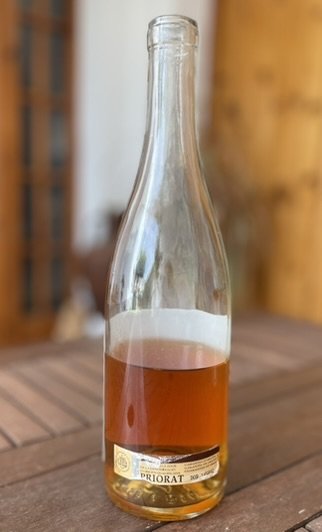Wine of the week
Alan Nance relishes having some skin in the game.
Pesseroles Brisat 2018 (Mas Martinet)
DOQ Priorat
Varieties: Picapoll Blanc (43%), Pedro Ximénez (29%), Garnatxa Blanca (28%)
ABV: 13%
€40.95 from BlancoTinto
As Simon J Woolf makes clear in his book Amber Revolution: How the World Learned to Love Orange Wine, the tradition of macerating and fermenting white grapes on their skins is one with a long history across southern and eastern Europe. There are good reasons for this. The phenolic compounds present in grape skins offer protection against oxidation and make the resulting wine more robust – something that generations of artisan winemakers had learned by experience, even if they didn't understand the chemistry.
In Catalonia, an orange (or skin-contact) wine is known as a brisat, and it's a style that has had particular historical importance in the Terra Alta region. In 2022, this was given bureaucratic backing when the Terra Alta DO became the first in Spain to officially recognize skin-fermented white wines as a category (Vi Brisat) alongside reds and whites. But it's not only in Terra Alta where'll you find these wines being made.
Sara Pérez has long been recognized as a key figure in Priorat winemaking, whether through her work at Mas Martinet, or through the parallel project Venus La Universal, a joint venture with her partner in life and wine, René Barbier Jr. Her willingness – in both vineyard and cellar – to experiment and look to the future while also drawing deeply on past traditions has seen the emergence of a memorable series of wines, one of which I have before me right now.
The Pesseroles Brisat 2018 is a blend of three traditional Priorat white varieties (Picapoll Blanc, Pedro Ximénez and Garnatxa Blanca) that were co-planted in 2002 in a parcel alongside the Camí de Pesseroles that runs between the villages of Gratallops and Torroja de Priorat. Grapes were hand-harvested and foot trodden with no destemming, before being left to ferment with native yeasts in three glazed ceramic jars. No sulfur was added at this stage, and the cap of skins and stems was left largely undisturbed.
After 30 days, they pressed and racked the wine into glass demijohns, where it was left to age for 27 months. There was no fining before bottling, and just 796 bottles were produced of what was only the third vintage of this wine.
The first thing that hits you is the intense amber colour, and that intensity continues as you sup. On both nose and palate this is rich and multilayered, with hints of orange peel, peach and hazelnuts, as well as oxidative notes that immediately made me think it would be a good substitute for a Manzanilla or Fino alongside a plate of jamón de bellota.
Despite the intensity of aromas and flavours, it remains fresh and tense with a stony backbone that evokes the landscape from which it comes. Indeed, for all its complexity, it has a seemingly effortless, rustic elegance that reminds of the new-generation Priorat reds I also love.
So, do I recommend you seek out a bottle of Pesseroles Brisat? Definitely, if you can afford it. Will I be seeking out another bottle to uncork? Probably not, precisely because of the price tag (note that the 2020 is closing in on €50). But if your budget stretches to it, and you come across a bottle, then snap it up for a taste of the Priorat future. After all, the amber revolution will not be televised.


